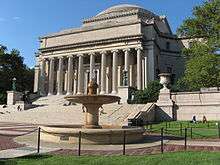Columbia/Barnard Hillel
Columbia/Barnard Hillel is the largest student activities group at Columbia University,[1] serving the Jewish population at Columbia's graduate and undergraduate schools, Barnard College, and the Jewish Theological Seminary. The Hillel encompasses over 50 groups focused on religion, social life, education, culture, Israel, and social justice[2] It is located at the Robert Kraft Center for Jewish Life, adjacent to the Columbia and Barnard campuses, in a building made out of Jerusalem stone.

During the Columbia University protests of 1968, the Hillel's predecessor organization was headed by Rabbi A. Bruce Goldman, who was dismissed by the organization's independent board of directors for participating in demonstrations at and takeovers of campus buildings.[3][4] During the protests, Goldman was "battered to semi-consciousness" and had to be hospitalized.[5]
The Kraft Center offers a variety of educational courses, including a daily Talmud class, currently taught by Itamar Rosensweig.
See also
External links
References
- DePillis, Lydia SGB Approves Two New Student Groups Columbia Daily Spectator. April 6, 2006, accessed May 2, 2007.
The SGB board considers presentations from prospective new groups at its weekly meetings and issues a recommendation to the general body, which makes the final decision. Each of the 89 political and religious groups in the general body has one vote (competitive and cultural groups are represented by SGB's sister organization, the Activities Board at Columbia), with the exception of Hillel, which has five.
- Columbia/Barnard Hillel, accessed May 2, 2007.
- Michael E. Staub, Torn at the Roots: The Crisis of Jewish Liberalism in Postwar America 2002
- Up Against the Ivy Wall: A History of the Columbia Crisis by Jerry L. Avorn, p. 228
- The Battle for Morningside Heights: Why Students Rebel, by Roger Kahn, 1970, p. 214.
